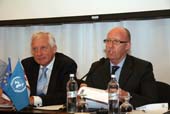Media monitoring declared a success
By Etuna Tsotniashvili
Monday, July 5

Six Georgian television companies were monitored in the pre- and post-election period. The main news bulletins and talk shows on Kavkasia, Georgian Public Broadcaster, Imedi, Maestro, Real TV and Rustavi 2, were monitored by the Caucasus Research Resource Centre (CRRC) at the request of the EU Delegation and UNDP.
Speaking at the conference Ambassador Per Eklund, Head of the EU Delegation to Georgia, said: “Media monitoring is the way to strengthen social ties between the media and the public. It promotes independent and professional reporting while encouraging citizens to make informed decisions.”
“There is a tradition in Georgia that media outlets represent either the authorities or the opposition and I think they should not have these labels. The media should aim to report things in a balanced, correct manner, not please the authorities or the opposition. They should try to satisfy the legitimate need of the public to understand what is happening and the public should be able to trust what the media is saying. This is a matter of journalistic ethics and competence and about changing the culture in the country,” Ambassador Eklund told The Messenger.
The 6-week monitoring was conducted in May and June 2010. A group of civil society representatives, which included prominent Georgian media professionals, writers and researchers, discussed the results in a weekly television show aired by the Georgian Public Broadcaster. The quantitative results of the monitoring were regularly published by the online magazine Civil.ge.
“The people of Georgia have a very clear understanding of the role the media can play in democratic processes, such as elections. This monitoring exercise was followed by discussions with civil society experts, media professionals and representatives of the television companies. Their feedback will help us to move forward with future work in this area,” said Jamie McGoldrick, UNDP Resident Representative in Georgia.
Commenting for The Messenger McGoldrick said that some changes in the Georgian media had become obvious during the election period TV coverage. The stations were obviously aware of their responsibilities, but it is also important that they have more understanding of the obligations they have to the wider public to help their decision making and help them make a judgement on the TV coverage of general democratic processes.
Editor-in-Chief of Rezonansi newspaper and member of the media monitoring group Lasha Tugushi says that the monitoring can be assessed positively because “we made a kind of diagnosis of the Georgian media, including gaps and positive elements.” He said that unlike in previous elections this media monitoring received very big support from the West, as the EU supported it and played a big role in creating an almost exact picture of what the media was doing during thee election campaign. He said that the EU mission also did its best to ensure that debates were broadcast on GPB, though this was not pleasant for the Government.
Tugushi acknowledged that there are pro-Government and not pro-Government TV channels in Georgia but said he does not agree that the latter are significantly pro-opposition, because the monitoring stated that so-called pro-opposition TV channels allotted quite a lot of time to the ruling party and its candidate. He said that being pro-opposition means habitually looking at things from an opposition point of view, and the obvious stations such Kavkasia and Maestro are not doing this.
The monitoring of election coverage was undertaken as part of a larger initiative, which aims to increase the independence and professionalism of the Georgian media and provide balanced and neutral information to the public. The project is implemented by the United Nations Development Programme (UNDP) and costs EUR 500,000, being funded by the EU.
